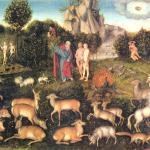IN THE BEGINNING
Image of God, Male and Female
It’s time to look at Genesis 1 and 2. I used to think that it made a big difference that woman was created after man, and that she was created to be a “helper” to man. But, as Lucy Peppiatt reminded me (in her soon coming book, which is excellent), this is one way of interpreting the creation story, but it is not the only way. Before we get to some of these gender issues, I just want to make a few notes about Genesis 1 and 2.
Genesis 1
This is a grand narrative of the incredible act of God to fashion a good and beautiful world: light, day and night, waters, sky, land and greenery, sun, moon, and stars, sea creatures and birds (1:1-20); and the command for all things to produce abundance (1:21-25).
In 1:26, adam (human) does not mean “Adam,” nor does it mean “man/male.” We know that because it switches immediately from adam (singular) to “they” (plural), implying that adam stands for human, male and female. This seems fuzzy in 1:26, but becomes more clear in 1:27 when they are defined as “them: male and female.” They are created in God’s own image, which means they are like him in special ways that are not true of other creatures. Presumably, this relates to their unique ability to rule (wisely?) over all the creatures of the world. This is said twice, in 1:26 and 1:28.
If all we had was Genesis 1, we would naturally assume men and women were equals, partners and co-rulers on earth as the image of God. There is not a whiff of headship, male-leadership, or “gender roles” here. Put another way, if the dinosaurs had questions, they wouldn’t necessarily go to Adam first and foremost.
This second account clearly goes back and re-tells parts of the creation story in a bit of a different way. We are given more details about the actual formation of the man (2:7). He is made from earth. Man is given work in the Garden, he must care for it (2:15). But he is warned not to eat from the special tree of the knowledge of good and evil (2:16-17). (A bit of foreshadowing—woman is not made yet, and had not received this command first hand as far as we know.)
So then, God formed animals and saw whether they might work as helpers for Adam (2:20). “Helpers” to do what? We are not told, but either it means those who would tend the Garden (from 2:15), or to help rule the earth (from 1:26-27).
Let us not get tripped up on the word “helper” (2:18, 20). This word (ezer) does not mean “assistant,” but neither does it mean “savior.” “Helper” is actually a good neutral word: someone who helps someone else. If my car breaks down and I have to push it to the side of the road, I need help, someone else to share the work.
When Genesis says that woman was made from man’s rib, that does not mean she is derivative, but simply means she is like him (bone of my bones and flesh of my flesh). She is not less than him, she is human like him. He is not superior in any way because he was made first. (Otherwise, why were humans made last in Genesis 1?) He clearly needed help with his vocation, and God created woman to partner in the work. Nothing from Genesis 2 clearly establishes headship, female submission, or unique male leadership. In fact, quite the opposite, man is not commanded to lead or guide woman; he is “united” to her (2:24) and they become one.
The Big Picture
When I read Genesis 1 and 2, here is what I think these chapters are communicating about humans.
- A Unified Species: The first mention of human(s) is 1:26, and they are treated as one thing, a unified species, made in the image of God and created to co-rule.
- Two Types: From 1:27, the clear addition is there are two types, male and female.
- Man needs help: In 2:18, it is made clear Adam can’t do this work alone, he needs help.
- Woman helps man: The animals cannot suffice, so woman is created from man to show her fitness for helping him.
I can see no clear Creation signals that man is given special command to rule or serve as leader over woman. Quite the contrary, he is seen as incomplete and lacking without her. That doesn’t make her superior. Presumably she needs him as much as he needs her, but all in all everthing is considered very good because there is the possibility of these two being united as one.
Next, we will look at the spoiling of Eden according to Genesis 3.












